





Il Senso De Acqua is modeled, in a fashion, after the great city of Rome at its height. Caesar rules the city, the Senators and wealthy citizens and merchants enjoy lives of relative luxury, even in these hard times, and the lower classes are relegated to eaking out a living as best they can. Below these struggling souls are the poor and destitute. These unfortunates fight every day simply to exist; working in any job they can, no matter how degrading or dangerous, hoping to earn, steal or beg enough to live another day.
The city itself is crowded, but mostly clean thanks to its many canals which carry waste into the sea. The lower-class districts are an exception to this, as the city workers do little to maintain the cleanliness of the streets and buildings in these dangerous, disease-filled areas. Here, refuse, filth and the occasional body is left in plain sight, there to rot until citizens or the rae city work group passes by to remove it.
The city boasts many of the landmark buildings ancient Rome had; A senate building, Emperor's palace and Arena. A large merchant area, temple district and cobblestone roads and streets speak to its civilized past. The large wooded grove which makes up a sizeable portion of the Foreign district stand in stark contrast to the cold stone of the rest of the city. Here, the elves and druids of the city live in peace with their own little patch of nature.
Il Senso De Acqua is primarily a human city and after many generations of human rule, its citizens are negatively disposed toward the humanoid races which exist within the walls. While some influential citizens and a few senators work for better treatment for the Elves, Halflings, Gnomes and Half-Orcs, the bulk of the government is against them and only the fear of an open revolt keeps the "lesser" races safe.
Daily Life
In Il Senso the artisans' workshops open at break of down. The traders, also open their shops quite early in the morning, putting their merchandise on display. But what a noise, what a crowd in the streets!
In the morning the teachers, in the night the bakers, all day long the armor-makers; the money-changer striking coins with Caesar's minting die, a Dwarven stone carver hitting on a stone, while followers of Cadeum preach his greatness from corner podiums. In other words it is impossible to have rest or to "live" in Il Senso De Acqua.
In the courts lawyers defended the rights of their client in front of a magistrate and a large public.
The children are at school all day, except for a short lunch break during which they return home.
At midday the Citizens go home for lunch. Then go to the baths or the Thermotoriums (Cafe's), the only meeting places in a city of about twelve thousand inhabitants. The distance to the baths was a problem, because they could be reached only by feet; horses or other means of transport could not circulate. At sunset when the baths close, the people go back home for dinner.
Coming out of the baths the people meet the fans of the of the circus or the theatre who are also going home for dinner. Dinner marks the end of the day for the citizen.
Playing a Citizen of Il Senso De Acqua
While the adventurers forging new paths into the wilds outside the city walls are hardly "average" citizens, they share some common traits with their more timid neighbors.
It is the rare Human who views his humanoid neighbors with anything but indifference, if not downright hostility. The prevailing notion in Il Senso is that, if it were not for the humanoids taking up space and food, the city would be in better shape than it is. Non-human adventurers are no doubt seeking to leave the city as much to better their own lives as to save the city itself.
All citizens have grown up with a healthy respect for the Legion. These professional soldiers have, more than once, fended off orc and goblin raids on the city's walls and foraging parties. They are, typically, hard-eyed and steely nerved individuals who are no strangers to a fight. The Legion acts as the city's police force and most citizens take pains to follow the rules and thus avoid their attention.
Above the Legion is the elite Praetorian Guard, a group of veteran soldiers who serve as the Emperor's bodyguard and shock troops in time of great risk to the city. Most have served with distinction in the Legion and are veterans of many skirmishes. Corruption and sloth have taken their toll on the Praetorians however, and now the average citizen avoids their patrols at all costs, uncertain if they will be the target of bullying or arrest.
Religion is an important part of a citizen's life; Praying to a single deity is common, but many citizens "take no chances" and pay homage to many deities in the hopes of currying favor with at least one of them. Most homes contain a small shrine to a favorite deity. Those who commune with the gods are regarded with great favor by the average citizen, and even the druids are looked upon with warmth for their treaties with the gods and goddesses who provide the food and water for the city.
Magic is common in the city, though its practitioners are still viewed with awe and some suspicion. The mysterious Arcane Tower, with its imposing stone walls and secretive occupants do little to allay these fears. Wizards and, to a lesser degree Sorcerers are tolerated and treated with some respect, as the average citizen is never quite sure what one of these mysterious individuals can do.



